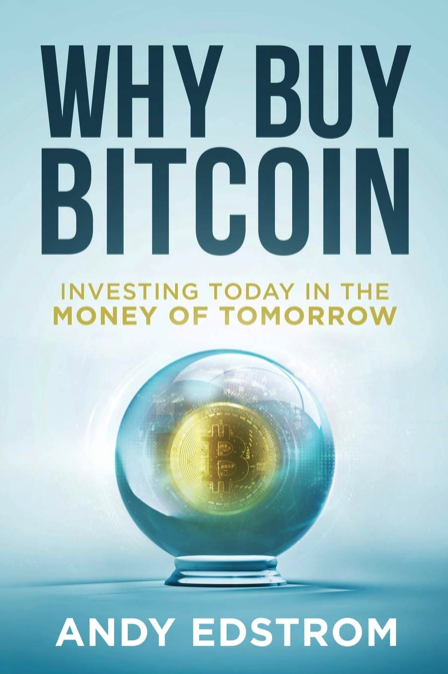
Andy Edstrom, CFA, CFP is Head of Institutional at Swan Bitcoin. He may be best known in Bitcoin for authoring Why Buy Bitcoin, opining that MicroStrategy might borrow in order to buy Bitcoin, and for shaming wealth managers for not owning Bitcoin for their clients. He can be found on Twitter at @edstromandrew, and his podcast appearances and writings can be found at andyedstrom.com.
Interview Date : 10th February 2021
Why did you write Why Buy Bitcoin?
I wrote it for a few reasons. One of the reasons was to educate my clients. I am a financial adviser and a wealth manager, so I invest money for clients to earn them a rate of return. I encountered Bitcoin for the third time in 2017. I had ignored it the first two times, but the third time, I recognized it as perhaps the most attractive investment I would ever come across in my lifetime. So, I felt that I had to explain it to friends, family, my clients, and other people.

Is Bitcoin difficult to understand?
Yes, it is difficult to understand Bitcoin. Although many of the concepts are simple, if you take it at its face, it is money that you can use without someone’s permission and that is scarce. Nobody is taught what money really is, and that was also my personal experience. I managed to take an economics degree from a good college and work in the investment business for a decade and a half before I figured out what money was. It is quite shocking that even people who worked with money for a living don’t understand it fundamentally.
How is the Moral Foundations Theory related to Bitcoin?
Moral Foundations Theory by psychologist Jonathan David Haidt is a concept that I wrote an article with Peter McCormick about. The theory states there are 6 moral foundations that seem to be deep-seated in people’s minds. Groups with these values were probably more successful than others over long periods of evolution. Those six different areas of moral concern are care versus harm, fairness versus cheating, liberty versus oppression, loyalty versus betrayal, authority versus subversion, and sanctity versus degradation.
How are those 6 foundations applied to Bitcoin?
Care versus harm can be applied to environmentalism. Many people think that Bitcoin is unfriendly to the environment, but I think the opposite.
Fairness versus cheating can be understood as the application of how Bitcoin is distributed, including the fact that early adopters may have more bitcoins than later adopters.
Loyalty versus betrayal is near and dear to my heart because I spent a career in the financial system. Generally, the financial system looks after its interests, but Bitcoin is a challenge or threat to it. I see Bitcoin as a betrayal to the financial system, although frankly, the financial system has betrayed the average person for a long time now. I’d say it’s a righteous betrayal in that respect.
Authority versus subversion with respect to Bitcoin is relative to anti-authority. Applying that to money in general, most people were raised to think that it’s the government who must create the money, but Bitcoin challenges that idea.
Sanctity versus degradation is an interesting dynamic. If you look at a $1 bill or a $20 bill, they are all these images of venerated figures. The $1 bill has George Washington, one of the founders of the country and it has the words “In God, we trust” inscribed in it. This is an attempt to associate money with these sacred images or concepts.
Liberty versus oppression is Bitcoin’s strongest aspect. Bitcoin allows you to transact and hold value outside of the legacy financial system. It is “freedom money.”
Why is the psychology of human behavior regarding Bitcoin important?
The psychology revolving around Bitcoin is an important part that has to be discussed. I wrote an article in part to recognize a mistake that I had made which was just trying to convince people that the value of Bitcoin was based on economics. It was very focused on logic and calculation, etc. as opposed to attempting to understand the average person’s psychology and pulling on the threads that might help them understand Bitcoin in other ways. How people feel and understand Bitcoin is critical to how Bitcoin will be adopted.
What are the strongest points you make in your book, Why Buy Bitcoin?
Why Buy Bitcoin was released in September of 2019. One of the strongest points of this book is the explanation of what makes something good money, which almost nobody is taught in school. I believe there are 14 characteristics of what defines good money and no form of money scores highly on all of those characteristics. The 14 characteristics are identifiable, durable, divisible, dense, transferable, scarce, short-term stable, long-term stable, fungible, required for some important purpose, backed by a powerful entity, censorship-resistant, unseizable, and private. Different forms of money have different scores because they have different strengths and weaknesses. This is the piece that most people miss about Bitcoin: they fail to understand what makes something good money and then compare things logically.
How do you measure what is good money?
In the book, I take all those 14 characteristics and I use a 0 to 5 scale, with 0 being the lowest and 5 being the highest. I score the US dollar, gold, and Bitcoin. The total score of Bitcoin is already higher than gold, but it’s still lower than the dollar. But the trend is in Bitcoin’s favor. Gold is not changing. It has been the same for a long time but the U. S. dollar and other fiat currencies are getting printed faster and faster, thus becoming less scarce. Bitcoin is improving because it is getting scarcer. There are all these featured layers being built on top of it to make it better. According to today’s score, the US dollar scores 52, gold scores 46, and Bitcoins scores 47. However, Bitcoin in the future will likely score 57. So, Bitcoin is already better than gold, but in the future, it may also be better than the dollar.
What is Bitcoin’s weakest point?
Among the 14 characteristics of what makes good money, Bitcoin scores lowest at short-term stability. Meaning, short term price stability or short-term value stability is one of Bitcoins’ weakest characteristics today as money. Fortunately, it is getting better and we can confirm that by how its volatility has reduced over time. I expect that as it develops, the volatility will go down even more, but until that happens we should expect significant price falls on the way. Moreover, we should expect that statements and comments by influential people concerning Bitcoin can affect the price exactly.
How do you convince your clients to get exposure to Bitcoin?
If you’re my client, you already have a copy of my book which I sent to you. So, I say “please read the book” first, and if you say “no”, I proceed by saying “I hope you trust me to get you some Bitcoin exposure”. And, so far, I’ve had good success with that. Almost none of my clients have said no to owning Bitcoin.
How is the competition between Bitcoin authors?
Various writers are doing a tremendous job by covering different and important topics about the space. I think there’s not much competition because there’s so much to cover. Most people who get interested in Bitcoin want to read multiple books because each of the books on the market has something to offer. One thing that sets my book apart is discussing the 14 characteristics of what makes good money. That framework is unique to my book. Moreover, it is an investment thesis discussing how to value Bitcoin and what the potential upsides and risks could be as an investment. I wrote for a broader audience with the support of my excellent editor, Beth Rashbaum. She edited one of Stephen Hawking’s books and also Alice Schroeder’s book, The Snowball: Buffett, The making of an American capitalist, one of the most popular Warren Buffett biographies.
Who uses gold as an investment?
As an investment, gold is used primarily by individuals. It’s used sometimes by institutional investors, but rarely by companies to hold on to their balance sheets. So, companies like Tesla and MicroStrategy putting Bitcoin on their balance sheets is a new development.
Interviewer , Editor : Lina Kamada
【Disclaimer】
The Article published on this our Homepage are only for the purpose of providing information. This is not intended as a solicitation for cryptocurrency trading. Also, this article is the author’s personal opinions, and this does not represent opinion for the Company BTCBOX co.,Ltd.


